The VMware service defines two or more different branch topologies designated as Bronze, Silver, and Gold. In addition, pairs of SD-WAN Edges can be configured in a High Availability (HA) configuration at a branch location.
Bronze Site Topology
The Bronze topology represents a typical small site deployment where there are one or two WAN links connected to the public internet. In the Bronze topology, there is no MPLS connection and there is no L3 switch on the LAN-side of the SD-WAN Edge. The following figure shows an overview of the Bronze topology.

Silver Site Topology
The Silver topology represents a site that also has an MPLS connection, in addition to one or more public Internet links. There are two variants of this topology.
The first variant is a single L3 switch with one or more public internet links and a MPLS link, which is terminated on a CE and is accessible through the L3 switch. In this case, the SD-WAN Edge goes between the L3 switch and Internet (replacing existing firewall/router).
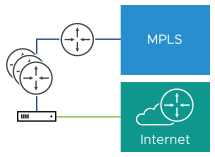
The second variant includes MPLS and Internet routers deployed using HSRP with an L2 switch on the LAN side. In this case, the SD-WAN Edge replaces the L2 switch.
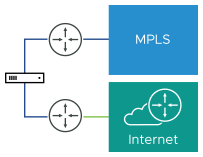
Gold Site Topology
The Gold topology is a typical large branch site topology. The topology includes active/active L3 switches which communicate routes using OSPF or BGP, one or more public internet links and a MPLS link which is terminated on a CE router that is also talking to OSPF or BGP and is accessible through the L3 switches.
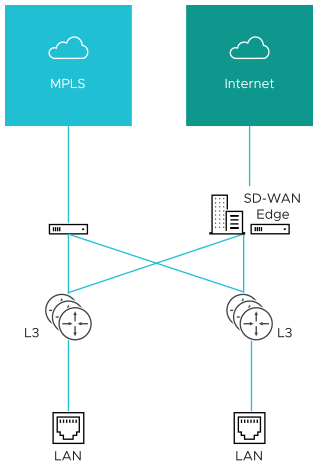
A key differentiation point here is a single WAN link is accessible via two routed interfaces. To support this, a virtual IP address is provisioned inside the edge and can be advertised over OSPF, BGP, or statically routed to the interfaces.
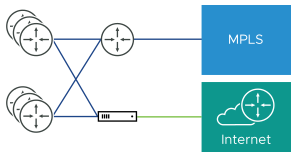
High Availability (HA) Configuration
The following figure provides a conceptual overview of the VMware High Availability configuration using two SD-WAN Edges, one active and one standby.
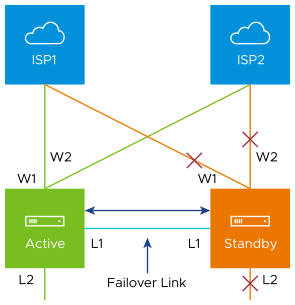
Connecting the L1 ports on each edge is used to establish a failover link. The standby SD-WAN Edge blocks all ports except the L1 port for the failover link.
On-premise Topology
The MPLS network runs BGP and peers with all the CE routers. At Hub 1, Hub 2, and Silver 1 sites, the L3 switch runs OSPF, or BGP with the CE router and firewall (in case of hub sites).
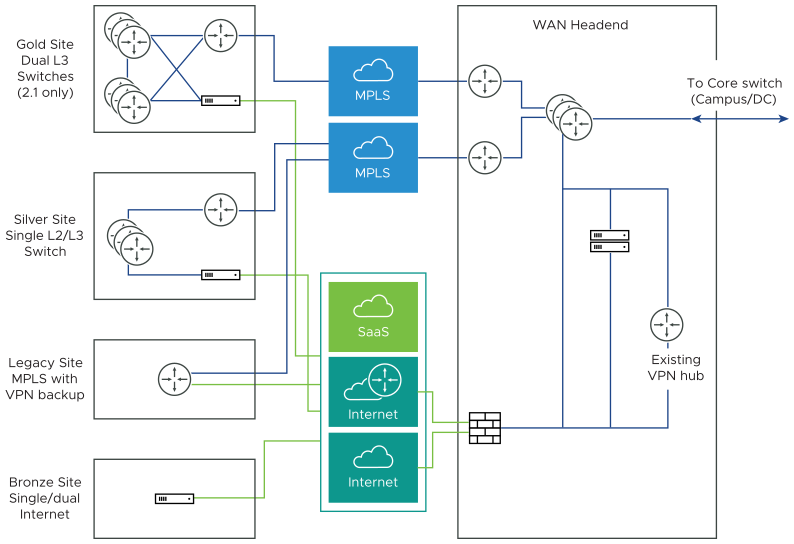
In some cases, there may be redundant data centers which advertise the same subnets with different costs. In this scenario, both data centers can be configured as edge-to-edge VPN hubs. Since all edges connect directly to each hub, the hubs in fact also connect directly to each other. Based on route cost, traffic is steered to the preferred active data center.
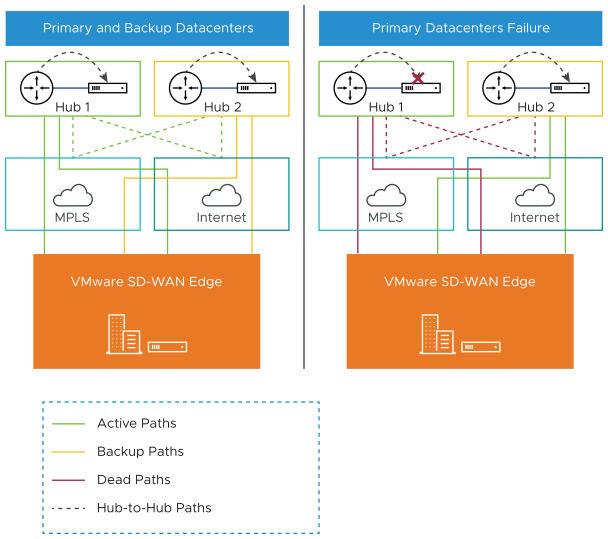
In previous versions, users could create an enterprise object using Zscaler or Palo Alto Network as a generic Non VMware SD-WAN Site. In 4.0 version, that object will now become a first-class citizen as a Non VMware SD-WAN Site.
The Cloud-Delivered solution of VMware combines the economics and flexibility of the hybrid WAN with the deployment speed and low maintenance of cloud-based services. It dramatically simplifies the WAN by delivering virtualized services from the cloud to branch offices. VMware customer-premise equipment, SD-WAN Edge, aggregates multiple broadband links (e.g., Cable, DSL, 4G-LTE) at the branch office, and sends the traffic to SD-WAN Gateways. Using cloud-based orchestration, the service can connect the branch office to any of type of data center: enterprise, cloud, or Software-as-a-Service.
SD-WAN Edge is a compact, thin Edge device that is zero-IT-touch provisioned from the cloud for secure, optimized connectivity to applications and data. A cluster of gateways is deployed globally at top-tier cloud data centers to provide scalable and on-demand cloud network services. Working with the Edge, the cluster delivers dynamic, multi-path optimization so multiple, ordinary broadband links appear as a single, high bandwidth link. Orchestrator management provides centralized configuration, real-time monitoring, and one-click provisioning of virtual services.